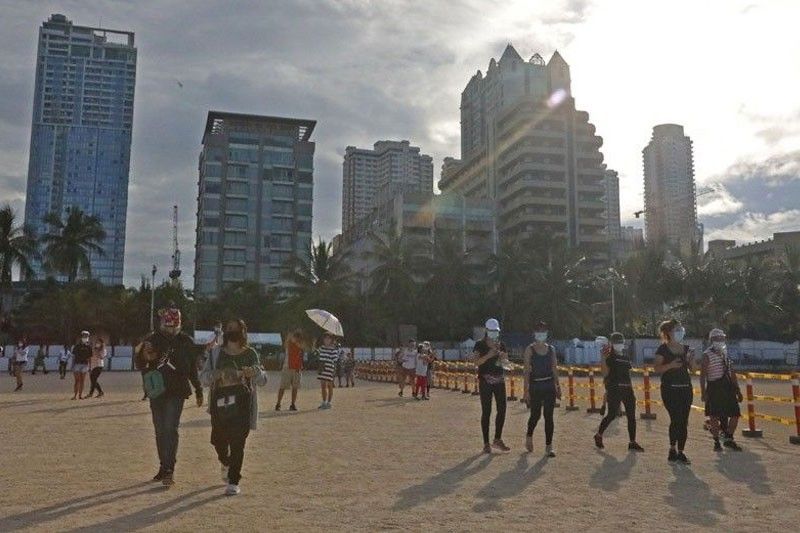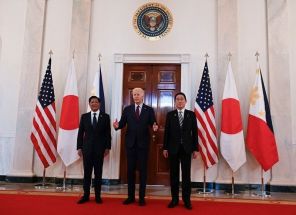Most Metro Manila mayors favor MGCQ by March

MANILA, Philippines — A majority of Metro Manila mayors have voted to ease the quarantine status of the metropolis to the most relaxed modified general community quarantine (MGCQ), Navotas Mayor Toby Tiangco said yesterday.
Tiangco, who was against the easing of quarantine restrictions, said nine of the 17 mayors wanted Metro Manila to be placed under MGCQ from the current GCQ. He said he favors a gradual easing of quarantine restrictions based on the trend of COVID-19 infections.
The mayors, comprising the Metro Manila Council, will relay their position to the national government’s COVID-19 task force.
“We can slowly open up now,” said Metropolitan Manila Development Authority (MMDA) chairman Benhur Abalos. He said statistics on hunger and joblessness presented by the National Economic and Development Authority (NEDA) and the Department of Trade and Industry are “very frightening.”
Malabon Mayor Antolin Oreta III said he voted for the more lenient MGCQ because he could hardly tell its difference from the GCQ currently in place.
“Might as well make it to MGCQ… But still, it is the President who decides. We are merely suggesting,” Oreta said.
Manila Mayor Isko Moreno said he also supported lowering Metro Manila’s quarantine status. “We need to create more economic activity,” Moreno said.
Valenzuela Mayor Rex Gatchalian said he also voted against MGCQ, citing rising COVID-19 cases in the city.
“Though we see the numbers stabilizing, we still feel that we need more time to stabilize the ground before we ease up on quarantine restrictions,” Gatchalian said.
Meanwhile, the Metro Manila Council also voted to lower age restrictions to the 15-65 year old bracket from 18-65.
Nine of the mayors who voted for MGCQ also agreed to allow those aged 15-65 to go out of their homes.
Of the eight mayors who wanted to remain under GCQ status, four wanted to retain the allowable age to 18-65, while the remaining four wanted to lower it to 15-65, Tiangco said.
Marikina Mayor Marcelino Teodoro said Metro Manila mayors are against the proposal of the NEDA to allow five to 70-year-olds outdoors.
“Mayors really don’t want to lower the age restrictions to five-years-old to 70-years-old because the need for it is yet to be seen and it’s possible people in this age range would become ‘superspreaders,’” Teodoro said in a radio interview.
He said his fellow local chief executives would be submitting to the Inter-Agency Task Force for the Management of Emerging Infectious Diseases (IATF) their recommendations on the matter, but that if the government chooses to push through with NEDA’s proposal, they would have the power to implement their own policies within their own localities.
Thankful
Malacañang, presidential spokesman Harry Roque said, was thankful to the Metro Manila mayors for recommending the easing of quarantine classification in the capital region.
“When it comes to the support for MGCQ, we are thankful. It’s not a decision that is not based on science and reality. Many are going hungry and many are dying because of reasons that are not related to COVID-19,” Roque said at a press briefing.
“Let’s see what the decision of the President will be on Monday because the recommendation will be one of the items to be discussed during the Cabinet meeting,” he added.
Roque could not say whether Duterte would announce his decision on the mayors’ recommendation on Monday.
“Regardless of the decision to be made on Monday, I am personally in favor of looking at the two-week attack rate and the hospital care capacity before coming up with new quarantine classifications,” the Palace spokesman said.
“I will repeat, all of us are taking care of our health but we need to take care also of those who are hungry because of this pandemic,” he added.
Various business, academic and stakeholder groups have expressed support for NEDA’s proposal to place the entire country under the most lenient quarantine status.
In a statement, Philippine Chamber of Commerce and Industry (PCCI) president Benedicto Yujuico said they are in favor of NEDA’s call to transition to MGCQ “to stem further economic decline and help businesses regain lost ground.”
Yujuico also welcomed the enactment of the Financial Institutions Strategic Transfer (FIST) Act, as such would benefit small and medium enterprises.
The FIST law would allow banks to dispose of non-performing loans and assets through asset management companies.
“The pandemic has affected businesses across all sizes and economic sectors, including banks with higher-than-expected credit losses. The FIST law will not only clear banks of bad loans but also improve their liquidity, enabling them to help rehabilitate distressed businesses and support the economic recovery,” Yujuico said.
NEDA proposal backed
In a joint statement, different organizations said relaxing the prevailing mobility restrictions would ease poverty and hunger.
The organizations include the Foundation for Economic Freedom, Federation of Filipino Chinese Chambers of Commerce and Industry Inc., Management Association of the Philippines, Subdivision and Housing Developers Association Inc., and UP School of Economics Alumni Association.
“It is important to balance public health with the deleterious effects of poverty and hunger on our countrymen, and to maximize opportunities to attract foreign investments to create jobs and build the infrastructure for a strong digital economy,” the group said in a joint statement.
“For these reasons, we support the call of (NEDA) and our economic managers to shift the entire country to the less stringent modified general community quarantine, and to implement localized containment measures when needed.”
In line with the relaxation of restrictions, the groups urged the standardization of health measures across local government units (LGUs) to eliminate uncertainties.
The groups likewise, urged Congress to prioritize the passage of key economic liberalization laws designed to help the country attract more foreign investments.
These are the amendments to the Public Service Act, Retail Trade Liberalization Act and Foreign Investment Act.
“NEDA has explicitly stated that it has exhausted all possible actions at the executive level, and it is now imperative for our lawmakers to step in to enable the country to maximize economic opportunities for the economy to recover rom the effects of the pandemic,” they said.
“These pieces of legislation are the structural reforms that will complement the tax reforms recently enacted by the legislature and make the country more competitive in attracting FDI in a post pandemic era.”
Experts’ warning
The OCTA Research Group, however, has warned against easing of quarantine restrictions nationwide as proposed by NEDA.
In its latest monitoring report, the OCTA Research Group said Metro Manila “will be under a constant threat of a surge” if restrictions are relaxed to very loose levels.
“While we recognize and support the need to jumpstart the economy and create livelihood for our citizens, at this time, the proposal to shift the NCR to MGCQ by March 2021 amidst the backdrop of a more contagious and lethal UK variant spreading in the regions is not just risky but also contrary to sensible epidemic management,” it said.
The group presented a projection showing the number of new cases in the region may reach as high as 2,400 per day in 36 days if a surge similar to what is ongoing in Cebu City occurs.
“Note that 2,400 cases is per day was the level in NCR in August 2020 when the pandemic became unmanageable and NCR had to be placed under a stricter quarantine to curb transmissions,” said OCTA.
“Even with close monitoring, it may not be possible to avert this surge for the following reasons: clear trends do not appear until after 1 to 2 weeks, because initially, it is difficult to distinguish an actual surge from normal fluctuations,” it added.
OCTA also recommended finishing the vaccination of all health workers and giving LGUs more time to prepare for the transition before shifting Metro Manila to the most lenient quarantine restriction.
It also urged the Department of Health (DOH) to undertake an exhaustive study to gain a clearer picture of the extent of transmissions of the UK variant in the NCR.
“We believe that it should be the priority of DOH and the LGUs to ascertain that the threat posed by the more contagious and lethal UK variant is minimized before any decision to open up in the NCR is made,” read the report.
“To this end, aggressive implementation of response strategies to prevent the further spread of more contagious variants must be immediately undertaken in areas identified,” it added.
OCTA also urged Metro Manila mayors to reconsider and defer loosening age restrictions until they have consulted with health experts regarding the risks and benefits of this policy.
“We also believe that at this time, implementing this recommendation in the NCR would not just be risky but would be contrary to sensible epidemic management,” said OCTA. — Neil Jayson Servallos, Alexis Romero, Janvic Mateo, Ghio Onlg, Louella Desiderio, Czeriza Valencia
- Latest
- Trending






























